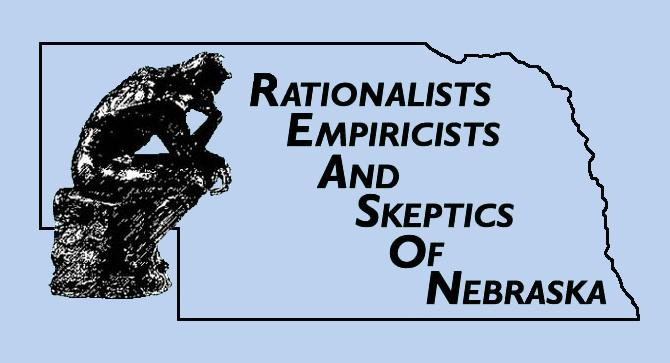The Skeptic's corner
Published in Omaha, Nebraska, on February 25, 2005, in Vol. 1, issue 6 of Voice of the New City.
I'm about as much of a born skeptic as a person can be. When I was a kid, I would try to convince the other children that there was no such thing as Santa Claus. I remember one such argument with a group offriends who were playing over at my house. No one could fly fastenough to visit every house on earth in one night, I tried to tell them. Anyway, he'd get caught eventually, breaking into all those places. And what about all the kids in countries where there is no Christmas?
Confused at my inability to reach my friends, I turned to my mother with a hey-back-me-up-here look on my face. Poor Mom, put on the spot and not wanting to upset the other parents in the neighborhood by sending their children home crying, made a careful, noncommittal statement worthy of Bill Clinton, the upshot of which was that perhaps Santa Claus was alive in our hearts. I felt so betrayed.
My experience with issues of belief and proof is literally lifelong. So you wouldn't think that it would be difficult for me to explain what our movement is about. And yet, probably the most difficult day-to-day aspect of being a member of REASON is explaining in a quick, concise way what the group is and what folks like us stand for.
On a recent trip to Portland, Oregon, my host – the kind of sensible, progressive person who should be a natural ally – gave me a ride to a meeting of a local humanist group I wanted to check out. On the drive over, I tried to explain what such a group was, what it meant to be secular, and why that was important. Not for the first time, I was surprised at how difficult it was. The conversation went around in circles for a few minutes, and I realized that there was a disconnect between what I was saying and what she was hearing that I couldn't quite put my finger on. My host seemed to have a hard time understanding why people who value reason would feel the need to congregate in a group. Everyone values reason, she seemed to be saying, so what makes these folks different from a random group of individuals? After that conversation, I decided I had better start putting some thought into what unspoken assumptions about my own worldview I was taking for granted.
A big part of the problem is that most people have very little frame of reference for the issues skeptics are concerned with. If you say you're a Christian, people know that you're saying something about your religion; if you say you're gay, people know you're saying something about your sexuality; if you say you're a Republican or a vegetarian or a New Englander, people know you're talking about politics or diet or birthplace. But when you say you're a skeptic…well, what kind of a thing is that, a skeptic?
We know what we are. And the fundamentalists and pseudoscienists know what we are: we're the surly heathens who keep trying to kick their sandcastles. But most people aren't particularly concerned one way or the other about things like creationism, psychics, junk science, and religious cults. There's an unwritten list of issues on which a person is expected to have an opinion. Taxes. Abortion. War. These issues are as much a part of our cultural landscape as the Simpsons and Stephen King. You know about these issues automatically. They're the mainstream, the zeitgeist, the center ring.
By contrast, it often seems like creationism and evolution are duking it out in a sideshow tent. And that's the most prominent of an entire range of issues that are part of a larger trend. People may have heard names like Deepak Chopra, Whitley Strieber, or James Dobson, but most likely they don't spend a lot of time worrying about how these and other mythmongers shape the culture we live, work, and raise our kids in. I remember picking up my first book on "unexplained phenomena" at my elementary school library when I was in 5th grade. It was full of kid-friendly introductions to the Loch Ness Monster, ghosts, the occult…everything necessary to turn one of my Santa-deluded peers into a little Fox Mulder. (See Dick. See Dick believe. Believe, Dick, believe.)
People like me (there's a dozen different names for us, each with a slightly different meaning: humanist, freethinker, agnostic, rationalist – I prefer skeptic) believe that something essential to human happiness is lost when we indulge these superstitions. Creationism, UFOs, Ayurvedic medicine, the Rapture: they are all different faces of the same tragedy. Every day, millions of people all over the world surrender something precious beyond words. They choose to believe in revealed truth instead of sitting with the ambiguities of life and making peace with them. They live in a world of their own making, instead of in the shared universe that belongs to all of us. They are not to be judged. This is a difficult world to live in. But those who tempt the lost and wounded into locking up the part of themselves that seeks and questions (often turning a profit off them in the process) have to be called what they are. They are predators.
And the people willing to call them what they are...that's us. Are you one of us?
Sean Griffith
